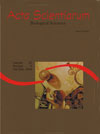Induction to etilic alcohol intake delays the healing process posfracture in rats
Abstract
The excessive ingestion of spirits cause metabolic and pathologic changes in different organic systems. In the bone it is known that alcohol causes osteoporosis, inhibits osteosynthesis and alters the metabolism of the bony cells. The present study aimed at verifying the influence of alcohol ingestion in the process of bone consolidation after fracture in rats. Twelve Wistar albino rats (Rattus norvegicus) were split in a control group (A), treated with commercial chow and water, and an experimental group (B), receiving commercial chow and sugar-cane brandy. Twenty-five days after fracture, the rats were killed and the collected material was subjected to light microscopy routine. It was observed that the bony callus was present in both groups of animals. In the regeneration region the animals from group A showed a smaller density of cartilage cells and thus a greater amount of newly-formed bone, while the animals from group B presented a larger density of cartilage cells, demonstrating a delay in the process of bone formation. According to the results obtained, we state that alcohol influences the fracture regeneration, delaying this process.Downloads
Download data is not yet available.
Published
2007-11-16
How to Cite
Pereira, K. F., & Conegero, C. I. (2007). Induction to etilic alcohol intake delays the healing process posfracture in rats. Acta Scientiarum. Biological Sciences, 29(1), 95-100. https://doi.org/10.4025/actascibiolsci.v29i1.129
Issue
Section
Animal Physiology
DECLARATION OF ORIGINALITY AND COPYRIGHTS
I Declare that current article is original and has not been submitted for publication, in part or in whole, to any other national or international journal.
The copyrights belong exclusively to the authors. Published content is licensed under Creative Commons Attribution 4.0 (CC BY 4.0) guidelines, which allows sharing (copy and distribution of the material in any medium or format) and adaptation (remix, transform, and build upon the material) for any purpose, even commercially, under the terms of attribution.
Read this link for further information on how to use CC BY 4.0 properly.
0.6
2019CiteScore
31st percentile
Powered by 

0.6
2019CiteScore
31st percentile
Powered by 












1.png)




3.png)













